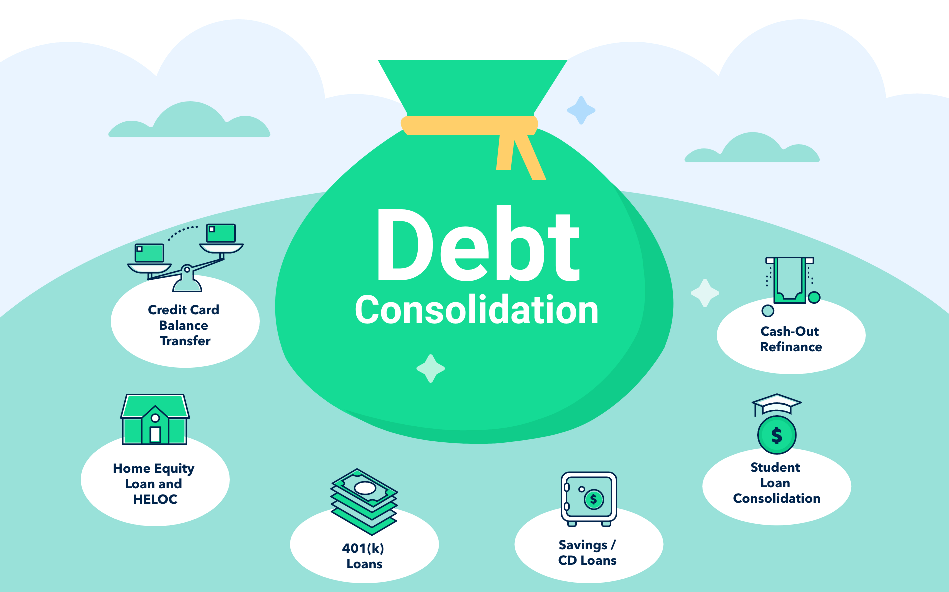
Debt can easily become overwhelming, especially when you’re juggling multiple credit card balances, high-interest loans, and other monthly payments. The stress of managing different due dates and varying interest rates can make it difficult to see a way out. This is where debt consolidation comes into play. One of the most effective strategies for consolidating debt is through a personal loan. In this blog post, we’ll explore how you can use a personal loan for debt consolidation, the benefits of doing so, and key considerations to keep in mind.
What is Debt Consolidation?
Debt consolidation involves combining multiple debts into a single loan, ideally with a lower interest rate. This simplification means you’ll only have to make one payment each month rather than several. The goal is to reduce the total interest you pay and make your debt easier to manage.
How Personal Loans Work for Debt Consolidation
A personal loan is an unsecured loan that you can use for various purposes, including debt consolidation. Here’s how it works:
- Assess Your Debt: Start by gathering all the details of your current debts, including the balance, interest rate, and monthly payment for each. This will help you determine the total amount you need to borrow.
- Shop for a Personal Loan: Look for a personal loan with a lower interest rate than what you’re currently paying on your debts. You’ll want to compare different lenders, taking note of the loan terms, interest rates, and any fees involved.
- Apply for the Loan: Once you’ve found a suitable loan, complete the application process. Lenders will typically check your credit score and financial history to determine your eligibility and interest rate.
- Use the Loan to Pay Off Debts: After being approved and receiving the funds, use the loan to pay off your existing debts. This step consolidates your multiple payments into one monthly payment.
- Repay the Loan: Now, your focus shifts to repaying the personal loan. Ensure you make on-time payments to avoid late fees and potential damage to your credit score.
Benefits of Using Personal Loans for Debt Consolidation
- Lower Interest Rates: Personal loans often have lower interest rates than credit cards and other high-interest debts, which can save you money over time.
- Simplified Payments: Consolidating your debts into one payment makes managing your finances more straightforward. You’ll only need to keep track of one due date each month.
- Potential Credit Score Improvement: Paying off credit card balances with a personal loan can lower your credit utilization ratio, which may boost your credit score. Additionally, consistently paying off the personal loan on time can positively impact your credit history.
- Fixed Repayment Schedule: Personal loans typically come with fixed interest rates and repayment terms, meaning your monthly payment will stay the same throughout the loan’s term. This predictability can help you budget more effectively.
Key Considerations Before Using a Personal Loan for Debt Consolidation
- Loan Fees: Some personal loans come with origination fees or prepayment penalties. Be sure to factor these costs into your decision.
- Interest Rates: While personal loans can offer lower interest rates, they vary based on your credit score and financial situation. If you have a low credit score, you might not qualify for the best rates.
- Commitment to Repayment: Consolidating debt with a personal loan is only effective if you commit to paying off the loan. Avoid accumulating new debt during the repayment period to prevent falling into the same financial situation.
- Risk of Falling Back into Debt: It’s important to address the root causes of your debt. If you don’t change the spending habits that led to the debt in the first place, you risk finding yourself in the same situation again.
Conclusion
Using a personal loan for debt consolidation can be a smart financial move if done correctly. It simplifies your payments, potentially lowers your interest rates, and can even improve your credit score. However, it’s essential to approach this strategy with caution, understanding the costs and committing to a repayment plan that will lead you to financial freedom. By taking these steps, you can regain control of your finances and work toward a debt-free future.
